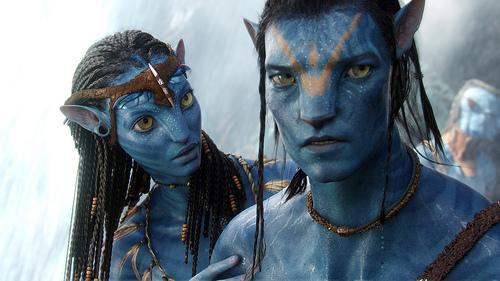
Courtesy Twentieth Century Fox
James Cameron’s “Avatar” is the latest in a tradition of gigantic films. Director Cameron has built a career on advancing special effects technology and using it tastefully. “Terminator,” “Aliens,” “Terminator 2: Judgment Day” and “Titanic” are all films which, underneath the mechanics and technology, have very simple and effective stories. Corporate greed has played a role in his past films, but the vast amount of political and social commentary present in “Avatar” is new for Cameron. He is at his best in “Avatar” as a visual stylist. When using motion-capture technology, he brings nine-foot-tall blue creatures to life, which is no easy feat. Thanks in part to the shoddy actors playing the human characters, the aliens seem more real than the rest of the cast.
When discussing “Avatar,” it seems more apt to compare it to a roller coaster or a thrill ride. It would seem weird to complain about storyline of a ride – which usually consists of a plaque detailing, for example, that it is “a runaway mine train.” Instead, you focus on the thrill and satisfaction you feel during and after the ride. This is where “Avatar” succeeds. As a visceral and visual experience, it has no peer. The breathtaking CGI creates not only a wholly believable alien world, but also strong native characters that inhabit the planet. But once you start to dig below the glossy surface, you find yourself staring into an intellectual abyss – pun intended.
Where the film/ride fails miserably is in its screenplay. One of the many lessons of the movie seems to be that the paramilitary squad and its corporate masters are bad people because they take a simplistic and stereotyped view of the natives of Pandora. Ironically, this is exactly the stance that Cameron takes regarding his human characters. For instance, Colonel Miles Quaritch is a combination of the worst aspects of General Douglas MacArthur and Chip Hazard from “Small Soldiers.” Cameron obviously wants to make him out to be an understandable villain, but why do all of his troops have to be ignorant meatheads? In real life, the military is made up of diverse and complex people with different ideas, views and opinions.
For evidence of Cameron’s simple-minded personal prejudice, here is an actual portion of the uncut screenplay that can be found online at the Fox studios Website (props to BigHollywood.com and Aintitcoolnews.com for pointing this out) that displays Cameron’s real views: “Cut To: Interior Armor Bay … The miners lock and load like the red-blooded redneck NRA supporters they are.” Imagine if he had written something similarly simple-minded about the natives. He would be derided as a racist.
The “Avatar” script also missed the boat on political depth. The reason that the corporation in the film is on Pandora is to mine a valuable substance named “Unobtanium.” Lazy name aside, the film never explains what is so valuable about Unobtanium. The corporate goon played by Giovanni Ribisi – who is aptly named “Parker Selfridge” – says early in the film that “this little gray rock sells for twenty million a kilo.” Exactly why is Unobtanium so valuable? It seems that Cameron was trying to make a point about mindless corporate greed and capitalism but in doing so he sacrificed a great opportunity for complexity. What if Unobtanium was needed to power a dying Earth? This would have forced the viewer to make a difficult moral choice and would have added much-needed layers to the story.
The depiction “Avatar” provides of the noble savage and the film’s distrust of modern society has very strong connections to the writings of French philosopher Jean-Jacques Rousseau. In Rousseau’s “On the Origin of Inequality,” he argues that man in his savage state is pure, virtuous and free but that this “noble savage” has been corrupted by civil society. “Avatar” borrows heavily from the mythology that Rousseau propagates. As many anthropologists have pointed out, man in his savage state is extremely violent and existence is harsh. This nostalgia for a simpler time where man was in touch with nature is backwards and counterproductive.
According to Cameron, what are we supposed to do in our own lives? This is a fair question to ask because the political nature of the film implies a positive political and social agenda. According to “Avatar,” are we to try our darndest to become something that we are not, in a place that is not our own? In my opinion, we should respect other cultures and be tolerant but not to the point to where we lose our own national, cultural or personal identities. On this point, “Avatar” seems to advocate that we throw off our jobs, friends and capitalist modern society to commune with nature, in order to be more authentic people. Remember, all of these lessons are coming from a man who just made over a billion dollars off of a film which could only be made in a capitalist and entrepreneurial society.